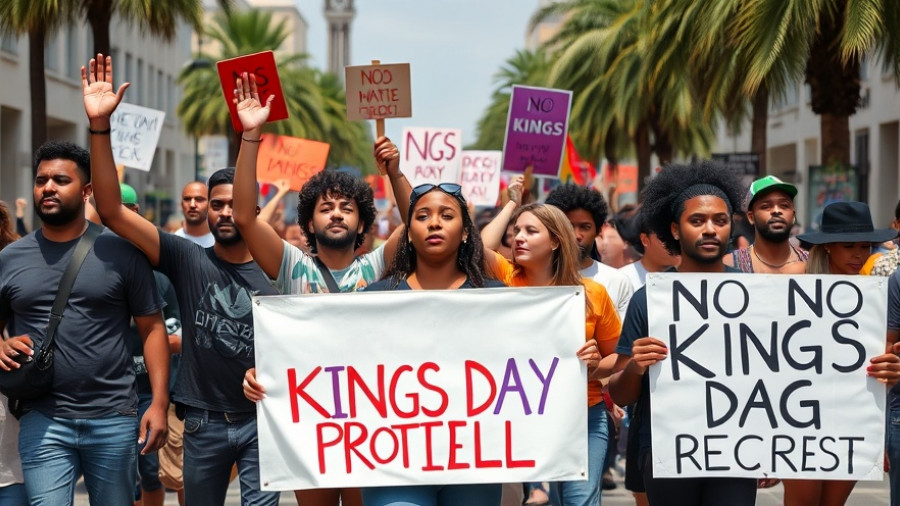
The Awakening of a Movement: No Kings Day Protests Set to Ignite Change
On Saturday, October 18, protests labeled "No Kings Day" are expected to light up streets across the San Francisco Bay Area and throughout the nation as citizens gather to challenge what many perceive as an increasing trend toward authoritarianism under President Donald Trump. Millions are expected to join this movement, which has already garnered significant attention due to its powerful resonances with ideals of democracy and community.
Concerns over Government Overreach Spark Nationwide Mobilization
The protests are not simply a reaction to the current political climate, but rather a clarion call to safeguard the democratic values that the United States was built upon. As Governor Gavin Newsom noted in a recent press conference, the implications of the president's decision to deploy the National Guard to cities like San Francisco has raised alarms about federal overreach. Newsom articulated the sentiments shared by many, declaring, "To threaten sending in the National Guard... is grossly illegal, immoral, and delusional." This resonates deeply with many grassroots organizations rallying under the "No Kings" banner.
The Coalition Behind the Protests: United for Change
More than 200 organizations are joining forces for this round of demonstrations, comprised of groups such as Indivisible, the American Civil Liberties Union, and many others that champion civil rights and social justice. Each of these organizations taps into the collective dissatisfaction with the current administration, armed with their own focus on specific issues like immigrant rights and healthcare access.
As noted in reports leading up to the protests, the collective angst surrounding immigration policies and militarized policing has driven many individuals to engage actively in local initiatives. These individuals and organizations have rallied to ensure that the momentum from the protests does not fade away post-event; community engagement is essential, they argue, for sustained reform.
Prior Protests: Lessons Learned and Strategies for Success
The previous "No Kings" demonstrations in June drew millions across the nation, marking one of the largest protest days in recent memory, according to estimates from organizations like Harvard's Crowd Counting Consortium. With figures ranging between 2 million and 4.8 million participants, the movement clearly gained traction by tapping into the frustrations felt by a significant slice of the American populace.
Real lessons have emerged from these experiences, most notably the importance of local participation. This time around, networks of grassroots organizers have been pivotal, emphasizing the need for every community to engage in actions that allow them to voice their discontent without having to travel to large urban centers.
Political Pushback: Why Opponents Resist
The preparations for Saturday's protests have not been without controversy; Republican leaders have labeled the gatherings as "hate America" rallies. House Speaker Mike Johnson's comments framing the protests disparagingly only serve to embolden organizers. Leah Greenberg of Indivisible countered by saying, "There is nothing more American than saying we don't have kings and exercising our right to peaceful protest." This rebuttal underscores the movement's goal of democratizing voices across diverse demographics.
Mobilizing the Masses: The Power of Numbers
Proponents of the No Kings Day rallies also cite the "3.5% rule," a theory that suggests that if 3.5% of the population mobilizes non-violently against a regime, it is likely to fail. With a population of over 330 million, this principle could imply that reaching a participation threshold of roughly 11 million people could signal a significant turning point in American political dynamics if the anti-authoritarian movement gains enough support.
Looking Ahead: The Role of Community in Civic Engagement
The No Kings protests are not an end in themselves, but rather a step toward fostering civic engagement and community awareness. It highlights the unique role local voices play in shaping national narratives. As lifestyle-conscious adults in the SF Bay Area prepare to take to the streets, the infusion of creativity, culture, health, and wellness into this movement may very well symbolize a shift towards a more engaged citizenry that values democracy over despotism.
As the day approaches, communities are urged to rally, stand together, and ensure that their voices are heard. For many, it’s about more than opposing a singular political figure; it embodies a collective foresight geared towards working for a better future.
Join in the action this Saturday, and be part of a movement where voices matter and communities thrive.
 Add Row
Add Row  Add
Add 



Write A Comment